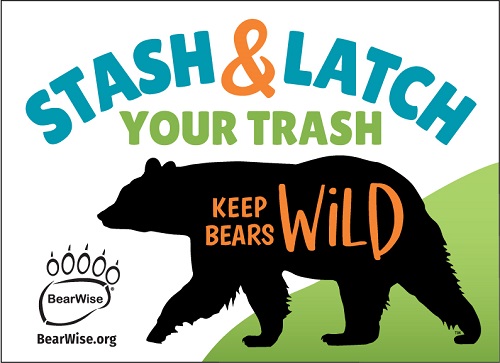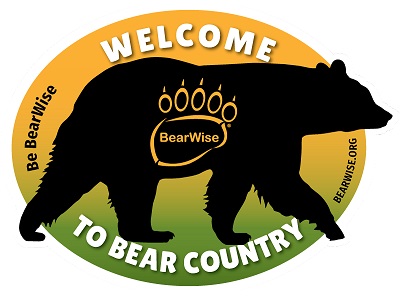In January, the California Department of Fish and Wildlife (CDFW) and the Nevada Department of Wildlife (NDOW) jointly announced their formal partnership with the national nonprofit BearWise, which was developed by leading black bear biologists to provide resources, information and consistent, science-based messaging on how to minimize black bear conflicts. CDFW subsequently reached out to BearWise to ask the organization to introduce itself to the Lake Tahoe community along with others around the state interested in black bear issues. What follows is a guest post by Linda Masterson, communications and marketing director for The National BearWise Program and author of the Living with Bears Handbook. Meet BearWise.
By Linda Masterson
If bears could read, we wouldn’t need BearWise®.
Bears excel at acting in what they perceive are their best interests: finding food, finding shelter, finding mates, raising their cubs, coexisting with each other. But they have no clue that avoiding people and people places would be in their long-term best interests.
But if bears could read, they would quickly learn that taking advantage of all those human-provided food sources carries risks that are far greater than any short-term reward. Bears are super-smart, resourceful and adaptable. They’d decide that no matter how tempting it was, staying far away from people was the wise thing to do.
Bears are exceptional mothers; they would immediately start teaching their cubs how to make a living off the natural landscape instead of how to scoot through pet doors into kitchens full of people food and bring the goodies back out to share. Or what night the unprotected trash goes out in which subdivision. Which dumpsters are easy to get into. Where to find a bird feeder full of seed or a yard full of chickens and bees. Which streets are lined with pretty trees that produce fruit that we don’t eat, but bears do. And which of the human neighbors put out a bear buffet of treats and then sit back and enjoy the bear show.
Since almost all conflicts with bears are caused by people inadvertently or purposefully attracting them, in a generation or two (of bears, not people) conflicts would fade into memories of the bad old days. Bear biologists and managers could finally focus on studying bear biology and behavior, preserving the habitat bears need to live off the land and doing everything in their power to ensure bear populations are healthy and thriving today, tomorrow and always.
People could live in and visit bear country knowing they’re doing their part to keep people safe and bears wild. All while enjoying the occasional privilege of glimpsing a bear in the woods going about the business of being a wild bear.
Unfortunately, bears can’t read. And people are more complicated and less adaptable than bears. That’s why we need BearWise.
What makes BearWise different? The BearWise program was started several years ago by 15 states in the Southeast. Other states soon saw the benefit of being part of a program that guaranteed that no matter where people lived or traveled in bear country, they got the same consistent, science-based message about living with bears. Today, BearWise is managed by a national team of bear biologists and wildlife communications professionals and supported by 34 member state wildlife agencies, including California and Nevada and the Association of Fish and Wildlife Agencies. And people all over the country turn to BearWise for information they can trust and practical resources and tools that work in the real world.
The BearWise mission is to help people live responsibly with black bears. The BearWise philosophy is that the best way to do that is to help people better understand what makes bears tick. Show them how everyone who lives in or travels to bear country can promote coexistence and prevent conflicts. And provide the resources and practical tools they need to help keep people safe and bears wild.
What does it mean to be BearWise?
It means getting up five minutes earlier so you can put your trash out in the morning instead of leaving it out the night before for a midnight bear buffet. Or investing in or creating a bear-resistant container that even the Tahoe Basin’s super-smart bears can’t defeat. And taking the time to make sure they’re closed, latched and cleaned out often.
It means taking down your bird feeders and adopting other ways to attract your feathered friends. Sorry, bird lovers, but there is no responsible way to feed birds when you live somewhere bears are active most of the year. But, good news, there are lots of ways to attract even more birds than you would with a feeder. Visit bearwise.org and check out the free "Attract Birds, Not Bears" bulletin.
It means following the BearWise Basics and keeping food and anything else with an odor (it doesn’t have to be a good odor) out of sight and smell of bears. Keeping vehicles clean and locked with the windows rolled up, or even better, parking them inside a locked garage.
When you’re BearWise, you know better than to store anything that might attract a bear on your back porch or deck. You lock your doors and close and lock your windows when you leave, and if there’s been a lot of bear activity in your neighborhood, you lock up when you’re at home.
If you’re being BearWise, your chickens and beehives are safely out of reach behind a well-maintained electric fence. You’ve got bear unwelcome mats outside the doors and windows of your summer cabin.
You feed your pets inside, or if you absolutely must feed outside, you pick up their bowls as soon as they’re done and clean up the area. And you resist the urge to feed strays or put out food for wildlife. Bears can’t read and they’re not polite; if there’s food available, they want some.
 What’s the harm in letting a hungry bear hang around your home or help itself to your leftovers?
What’s the harm in letting a hungry bear hang around your home or help itself to your leftovers?
The bear gets a meal it didn’t have to work for and you get to watch one of nature’s most amazing and charismatic animals … doing something totally unnatural that virtually ensures that eventually that bear will become way too comfortable around people and dependent on all the food sources people provide.
That leads to big problems for people: mangled trash containers, bashed-in birdfeeders, damaged fruit trees, raided gardens, coops and pens, demolished beehives, home and vehicle break-ins, and even injuries. It also leads to even bigger problems for bears. Bears that become dependent on human-provided foods may never fully develop a bear’s natural survival skills and often lead short, unhealthy, unhappy lives.
The bear biologists and bear managers who work for state wildlife agencies try every way they know how to encourage bears to leave people places alone. But bad habits that produce big food rewards for little effort are hard to break. Preventing conflicts is much more effective than trying to resolve them.
Recently the states of California and Nevada and a who’s who in the Lake Tahoe Basin sent out a joint interagency press release announcing their commitment to and strong support of the national BearWise program. The nine agencies represented include CDFW, NDOW, the USDA Forest Service, California and Nevada state parks, the Placer County Sheriff’s Office and the Tahoe Regional Planning Agency.
The state wildlife agencies will work closely with the USDA Forest Service Lake Tahoe Basin Management Unit and California and Nevada state parks to incorporate BearWise messaging as part of their united efforts through the Lake Tahoe Interagency Bear Team.
You can help by visiting bearwise.org and doing your part to keep people safe and bears wild in the Tahoe Basin … and wherever in bear country you might live or travel.